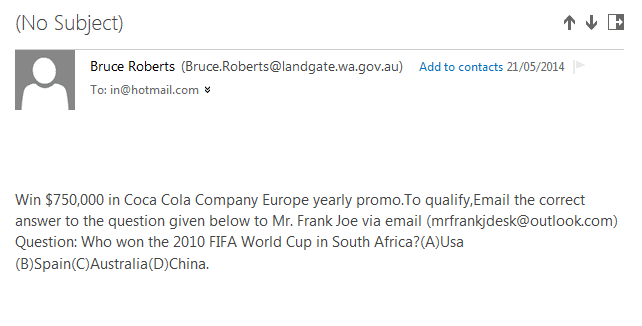What is Unsolicited Email – How to Identify and Respond

What Is Unsolicited Email
Did you know that over 50% of all email traffic is classified as spam? That’s right, every time you check your inbox, there’s a high chance that half of the messages are unsolicited and irrelevant to your needs.
Unsolicited email, also known as spam, can be a major nuisance for individuals and businesses alike. Unsolicited email refers to any message that is sent without the recipient’s consent or request. These emails often contain advertisements or promotions for products and services that the recipient has no interest in purchasing. Some may even include malicious links or attachments designed to infect computers with viruses or steal personal information.
The constant barrage of spam emails can not only clog up our inboxes but also waste valuable time and resources sorting through them. So, let’s dive deeper into the world of unsolicited email and learn how to take control of our digital lives.
What Does Unsolicited Email Mean?
Unsolicited email is also known as spam, junk mail or unwanted email. It is a type of electronic communication that is sent to a large number of recipients without their consent or permission.
These emails are usually sent for commercial purposes such as advertising, promoting products or services or attempting to scam individuals. Unsolicited emails can be annoying and frustrating because they clutter up our inboxes and waste our valuable time.
They can also be harmful if they contain malicious links, viruses or spyware that can compromise our personal information and security. Therefore, it is important to be cautious when opening emails from unknown senders and to always mark them as spam if they are unsolicited.
Signs of unsolicited emails learn to recognize
-
Unknown sender: If you receive an email from an unknown sender or an email address that looks suspicious, be cautious. It’s best to delete the email without opening it.
-
Generic salutation: If the email starts with a generic salutation such as “Dear Customer” or “Dear Sir/Madam,” it’s likely to be unsolicited. Legitimate emails from companies usually address you by your name.
-
Too good to be true: If an email promises you something that seems too good to be true, it probably is. Be wary of emails offering you large sums of money, free gifts, or prizes.
-
Urgent action required: If an email is urging you to take immediate action, it’s likely to be a phishing scam. Scammers often use urgency to pressure you into revealing personal information or making a payment.
-
Suspicious links: If an email contains a link, hover your mouse over it to see the URL. If the link looks suspicious, don’t click on it. Scammers often use fake links to direct you to malicious websites.
-
Spelling and grammar errors: Legitimate companies usually proofread their emails before sending them out. If you notice spelling and grammar errors in an email, it’s likely to be unsolicited.
-
Unfamiliar content: If you receive an email that seems unrelated to you or your interests, it’s probably unsolicited. Be suspicious of emails that you weren’t expecting or that don’t make sense.
-
Too much personal information: If an email asks for too much personal information such as your social security number or bank account details, it’s likely to be a phishing scam. Legitimate companies usually don’t ask for this kind of information over email.
Examples of Unsolicited Emails
-
Lottery Scam:
You receive an email claiming that you have won a large sum of money in a lottery that you never entered. The email asks you to provide personal information, such as your bank account details, to claim your prize. -
Phishing Scam:
You receive an email that appears to be from your bank or a popular online retailer, asking you to verify your account information by clicking on a link. The link takes you to a fake website that looks like the legitimate one, and prompts you to enter your login credentials, credit card information, or other personal details. -
Job Offer Scam:
You receive an email offering you a job opportunity that seems too good to be true, with little to no experience required. The email asks you to provide personal information, such as your social security number or passport details, to proceed with the job application process. Once you provide the information, the scammers can use it for identity theft or other fraudulent activities.
Is It Legal To Send Unsolicited Emails?
Sending unsolicited emails, also known as spamming, is a practice that has been frowned upon for years. It involves sending unwanted and unrequested emails to unsuspecting recipients who may not have given their consent to receive such emails.
While there are no laws that expressly prohibit the sending of unsolicited emails, there are laws that regulate their use. For instance, the CAN-SPAM Act requires email marketers to include an opt-out option in their messages and to provide accurate and truthful information about their identity and the content of their messages. Failure to comply with these regulations can result in hefty fines and even imprisonment.
The bottom line is that while sending unsolicited emails may not be illegal per se, it is certainly unethical and can damage one’s reputation as well as alienate potential customers. Therefore, it is advisable to avoid this practice altogether and focus on building a list of subscribers who have opted-in willingly to receive your messages.
When You Receive An Unsolicited Email?
While it may not be illegal to send unsolicited emails, they can still be a nuisance for those on the receiving end. The constant influx of unwanted messages can clutter up inboxes and waste valuable time.
It’s like an uninvited guest showing up at your door every day, interrupting your daily routine and demanding attention.
But what can you do when you receive an unsolicited email?
First and foremost, don’t engage with the sender or click on any links within the message. This could potentially lead to malware or phishing scams. Instead, mark the email as spam and move on with your day. Remember that you have the power to control what enters your inbox, so use it wisely.
How Do You Deal With Unsolicited Emails?
Dealing with unsolicited emails can be frustrating, but there are a few ways to avoid them.
Firstly, never respond to a suspicious email or click on any links within it. Doing so will only alert the sender that your address is active and encourage them to send you more spam.
Secondly, make use of filters provided by your email service provider. These filters can automatically move unwanted emails into a separate folder or mark them as spam.
Lastly, consider using an anti-spam software that can detect and filter out unwanted messages before they even reach your inbox.
Remember, taking these precautions not only saves you time but also protects your personal information from phishing scams and other online threats.
Is It Rude To Ignore Unsolicited Emails?
Did you know that according to a study by Radicati Group, Inc., the average person receives around 121 emails per day?
With so many emails flooding our inboxes, it’s understandable why some people choose to ignore unsolicited emails. However, is it rude to do so?
While some may argue that ignoring these emails is simply a way of protecting one’s time and energy, others believe that responding with a polite decline or unsubscribe request is the more courteous approach.
Ultimately, it comes down to personal preference and how one chooses to handle their digital communication. Regardless of your stance on the matter, remember that everyone has the right to manage their inbox in a way that works best for them.
Final Thoughts
In conclusion, unsolicited email is a term used to describe an email that is sent without the recipient’s permission. It is often referred to as spam and can be a nuisance for those who receive it. As we have discussed in this article, sending unsolicited emails is generally not legal and can result in penalties.
When you receive an unsolicited email, it is best to handle it appropriately. You can either unsubscribe from the mailing list or report the sender to your email provider. Ignoring these emails altogether may seem like the easiest option, but it could lead to more unwanted messages in the future.
Symbolically speaking, unsolicited emails are like weeds in a garden; they grow uncontrollably if left unattended. It’s important to take care of them before they spread and cause damage.
Just like how we need to regularly prune our gardens, we must also take care of our digital spaces by filtering out unwanted content.
In short, while unsolicited emails may seem harmless at first glance, they can quickly become a problem if not addressed properly. By taking action and dealing with them appropriately, we can maintain healthy digital environments and prevent further harm from occurring.







